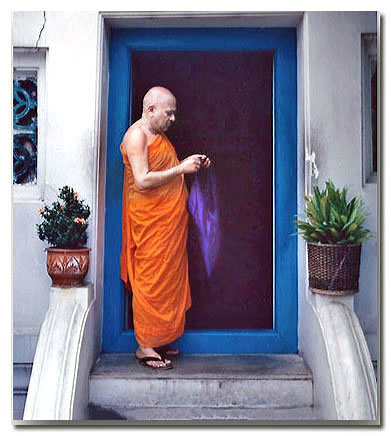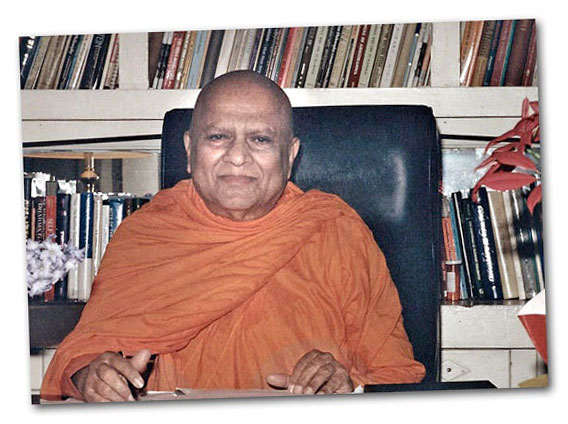|
U.S.
Buddhism Leader Havanpola Ratanasara Dies - The Los Angeles
Times
By ELAINE WOO, LA Times Staff
Writer
The Venerable Havanpola
Ratanasara, a monk who strove to build an American style of
Buddhism and led Buddhists, Catholics and other denominations in
interfaith dialogues, has died.
At 80, Ratanasara was
believed to be the oldest Buddhist monk in Southern California.
He suffered from diabetes and heart problems and died in his
sleep last Friday surrounded by monks in his apartment at the
International Buddhist Meditation Center in Los Angeles.
Ratanasara founded the Buddhist Sangha Council of Southern
California, an effort to unite Buddhists of disparate ethnic
backgrounds and traditions.
A leading exponent of a "united
Buddhism in America," he was a co-founder of the American
Buddhist Congress and served as executive president until 1999.
He also led efforts to ordain women as Buddhist monks. "He was
the glue in the Buddhist community in Southern California," said
the Rev. Kusala (Thich Tam-Thien), a Buddhist chaplain for the
University Religious Conference at UCLA. "He was so concerned
about getting people together and talking. . . . It's a rare
combination to find a scholar-monk . . . with a political bent
who could really change the community he lived in."
Ratanasara was a native of Sri Lanka who immigrated to the
United States in 1980 and became a U.S. citizen. After
undergraduate work in Sri Lanka, he earned a master's degree at
Columbia University and a PhD in education at the University of
London. In addition to holding university positions in Sri
Lanka, he was a United Nations delegate for that country in
1957.
In the United States, Ratanasara began to ponder
how Buddhists could join the mainstream of American society.
Largely because of immigration, the nation has the largest
variety of Buddhist traditions in the world, but Ratanasara saw
differences of language and culture as major obstacles to unity
within American Buddhism as well as to dialogue with other
faiths. "How can we become Americanized, yet hold to the core of
Buddhism? How can we develop an American Buddhism, which will be
vital and appropriate to this society and still retain our
individual, unique traditions?" Ratanasara asked in an interview
several years ago.
In 1987, he and the Rev. Karl
Springer, an American-born Buddhist leader, led efforts to
organize the American Buddhist Congress. The national body,
which weighs in on national debates from a Buddhist perspective,
represents members of many Buddhist traditions, including Thai,
Chinese, Korean, Sri Lankan, Tibetan, Vietnamese and Cambodian,
as well as American-born converts.
There are 3 million
to 5 million Buddhists in the United States, about 500,000 of
whom reside in Southern California.
Ratanasara served as
Buddhist representative to Pope John Paul II during the
pontiff's visit to Los Angeles in 1987. He also was co-founder
of the Los Angeles Buddhist-Catholic Dialogue, a program
pioneered by the local Buddhist council and the Catholic
archdiocese, and a past vice president of the Interreligious
Council of Southern California.
As past president of the
Buddhist Sangha Council of Los Angeles, which he organized in
1979, Ratanasara directed the most widely representative
regional Buddhist council in the country.
In 1988,
Ratanasara and his colleagues took a bold step by ordaining a
Thai woman. The action revived a practice that had died out
centuries ago in Ratanasara's Theravada Buddhist tradition,
which is mainly practiced in Sri Lanka, Thailand, Burma and
Cambodia.
More than 150 monks and worshipers came to
view Ratanasara's body Wednesday at the Wat Thai Temple in North
Hollywood. "He was like a father. He taught me to be a good
monk," said one of the mourners, the Venerable Havanpola Shanti,
a nephew of the Buddhist leader. Ratanasara is survived by four
nephews in the United States.
A service will be held at
the temple at 4 p.m. Saturday. After cremation, some of
Ratanasara's ashes will be taken to temples in Sri Lanka.
Ratanasara founded schools in Sri Lanka, including Buddhist
Studies International. Contributions to support Buddhist Studies
International can be sent c/o the Venerable Havanpola Shanti,
933 S. New Hampshire Ave., Los Angeles 90006.
Staff
writer Roberto J. Manzano contributed to this story.
|

Ven. Dr. Havanpola Ratanasara was born in the Sri Lanken Village of Havanpola Feb. 28, 1920. With his parent's permission, he became a novice monk at the age of 11, taking full ordination 9 years later at the age of 20. He went on to obtain his first university degree from the University of Sri Lanka, then a post graduate degree and diploma for Educational Research from Columbia University in New York and finally a PhD in education from the University of London in 1965. In the course of his academic career as an educator, he founded the Post Graduate Institute of Pali and Buddhist Studies at the University of Kelaniya in Sri Lanka.
In the early years, he participated in numerous international seminars and conferences presenting papers on various topics. One of his many books titled,
"Buddhist Philosophy of Education" was written to emphasize the feasibility of formulating a general system of education built on a foundation of Buddhist philosophy. First published in 1969 it was reprinted in 1995 to celebrate the opening of his
"Buddhist Studies International" in Sri Lanka, an institute dedicated to the promotion of Buddhist learning, peace and harmony among the peoples of the world.
In 1957 at the personal request of the Prime Minister of Sri Lanka, Ven. Ratanasara
was asked to represent Sri Lanka as a delegate to the
United Nations, the first Buddhist monk awarded this
honor. He is reported to have said during an interview in
1958 on being a United Nations delegate, "You Americans
believe in atomic bombs, hydrogen bombs and all those
things," he said the other day. "Well, we don't. We are a
peace-loving people and want no association with any power
bloc."
In 1980 Dr. Ratanasara emigrated to the United States, settled in Los Angeles and devoted himself to the promulgation of inter-Buddhist, inter-religious understanding and education. He initiated the establishment of the Buddhist Sangha Council of Southern California, an organization of Buddhist clergy of all traditions, serving as its president. He also served as Executive President emeritus of the American Buddhist Congress, a national organization of Buddhist temples and organizations, of which he is a founding member. In 1983 he founded the College of Buddhist Studies, Los Angeles and was the president and a member of the academic staff.
Dr. Ratanasara played an active role in inter-religious understanding for twenty years. He served as a Board Director for numerous international conferences on religion and peace. He was a member of the executive Council of the Interreligious Council of So. California and served as a Vice President. He served as Co-Chair for the on going Buddhist- Roman Catholic dialogue in Los Angeles. In 1992 Ven. Ratanasara was named the Chief Sangha Nayake (Judicial Patriarch) for the Western Hemisphere for his lineage, formalizing his role as chief advisor of his tradition. In 1995 he founded the Buddhist Studies International Center in Iriyaweteya, Sri Lanka, which has become a center for those who want to study Buddhism and meditate in a true Buddhist cultural setting. Buddhist Studies International is a center of training for American, Latin American, Korean, Indian, and Bangladesh students wanting to become teachers of Buddhism in their native homelands.
From his paper, "The Importance of Interfaith Dialogue" presented at the Inter-monastic Dialogue Gethsemani Monastery, Louisville, Kentucky July, 1996.
"Now, it seems to me that since we are so ready to I embrace each other, and claim that we are already honorary members of each other's religion, there is really no reason why we cannot continue talking. We are alike in that we all suffer, and our primary concern is the end of suffering; this is what we call liberation. As His Holiness the Dalai Lama has put it:
"I am interested not in converting other people to Buddhism but in how we Buddhists can contribute to human society, according to our own ideas." And I have always maintained, and maintain today, that if we had enough in common thirty years ago to begin talking to each other, then we have enough in common to continue."
At the time of his death May 26, 2000, he was working on:
"The Path to Perfection: A Buddhist Psychological View of
Personality, growth and Development."
|
 February
28, 1920 - May 26, 2000
February
28, 1920 - May 26, 2000
 February
28, 1920 - May 26, 2000
February
28, 1920 - May 26, 2000